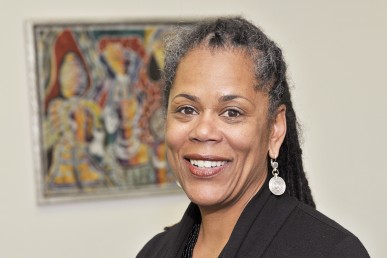Analyzing ‘prison nation’ impact on black women

The anti-violence movement must adopt “a critical black feminist approach,” says public policy expert Beth Richie.
Photo: Roberta Dupuis-Devlin/UIC Photo Services
Black women in poor neighborhoods have faced increasing violence because public policy has focused on unconditional punishment, not prevention, according to a new book by public policy expert Beth Richie.
Harsh sentencing since 2000, especially for drug trafficking, combines with gender dynamics in black neighborhoods to propel some women into violent relationships and crime, says Richie, author of Arrested Justice: Black Women, Violence, and America’s Prison Nation (New York University Press, 2012) and director of the Institute for Research on Race and Public Policy.
“I define the ‘male violence matrix’ as violence against women that has its roots in patriarchal arrangements, as well as by communities, institutions and agencies organized around patriarchal power and male supremacy,” said Richie, professor of African American studies and gender and women’s studies.
Most political responses to the culture of punishment address its effect on men, Richie said.
“While the impact on men is clear, there are also significant ways that women experience the negative effects of the prison nation, especially those women who also experience gender violence.”
Richie says, in her book, that the anti-violence movement has compromised with conservative leaders for the sake of limited progress.
She urges the anti-violence movement to adopt “a critical black feminist approach”:
• a focus by anti-violence activists on black women’s everyday experience of “gender subordination, structural racism, class inequality, and pressure to conform to hetero-normative sexuality”
• state-sponsored solutions are among options that include intervention by community officials, faith leaders, activists and family members
• culturally competent crisis intervention that reflects the norms, beliefs and practices of the community being served
• grassroots activists mobilizing around issues of youth disempowerment, sexuality, rebuilding the family and reframing gender relations.
• attention by anti-violence movement toward globalization’s role in chronic unemployment, war-related violence and sex trafficking.
“When America’s prison nation is understood to be the backdrop for male violence against black women, a new formulation of anti-violence politics will emerge,” Richie said.
